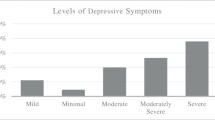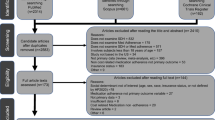Abstract
Background The use of medicines is an action that involves a change in behaviour and it is a complex construct involving reciprocal interactions between social, environmental and cognitive factors. This is particularly true when a patient uses medicines for asymptomatic chronic conditions, requiring life-long use. Objective To identify patient-perceived medication use challenges, determine the coping strategies used and investigate the relationship between patient-perceived challenges and self-initiation of coping strategies. Setting A premier 900-bed tertiary/teaching hospital located in Ibadan, Nigeria. Method Ten pharmacists conducted cross-sectional medication use interviews for a random sample of 324 medical outpatients in 4 weeks (25th October–19th November 2006). Main outcome measure Patient-perceived challenges with prescribed medications, self-initiated coping strategies used and relationship between patient-perceived challenges and self-initiation of coping strategies Results Eighty-one percent (324) of the random sample of 400 patients consented and completed the interview. Of these, 50.3 % were males while 49.7 % were females with mean age (SD) of 51.5 (17.6) and 52.1 (17.4) years respectively. The most frequent diagnoses were hypertension (53 %) and type-2 diabetes + hypertension (14.5 %). Two hundred and twenty-four patients reported one or more perceived challenges. Of these, 43.8 % were 65 years or older and about half reported at least 3 challenges. The majority (95.6 %) of patients who reported perceived challenges initiated one or more coping strategies without the knowledge of their physicians or pharmacists. Of 100 patients who did not report any perceived challenge, 43 % admitted initiating strategies to maintain perceived “cure” of their medical conditions. Self-initiation and use of coping strategies was far more likely among patients who reported perceived challenges (OR: 28.4, 95 % CI 26.1–30.5). The number of coping strategies reported appeared strongly related to the number of perceived challenges (r = 0.91, p < 0.001). Conclusion Perceived challenges associated with the use of prescribed medications and self-initiation of coping strategies appeared considerable among medical outpatients at a major teaching hospital in Nigeria. The risk of unauthorised initiation and use of varieties of coping strategies without the knowledge of clinicians was very high among patients who reported at least one perceived challenge.
Similar content being viewed by others
References
World Health Organization. Non communicable diseases and mental health adherence to long term therapies project. Adherence to long-term therapies: evidence for action. Geneva: WHO; 2003. p. 110. 1SBN 92 4 154599 2.
Mazzaglia G, Ambrosioni E, Alacqua M, Filippi A, Sessa E, Immordino V, et al. Adherence to antihypertensive medications and cardiovascular morbidity among newly diagnosed hypertensive patients. Circulation. 2009;120:1598–605.
DiMatteo MR, Giordani PJ, Lepper HS, Croghan TW. Patient adherence and medical treatment outcomes: a meta-analysis. Med Care. 2002;40:794–811.
Simpson SH, Eurich DT, Majumdar SR, Padual RS, Tsuyuki RT, Varney J, et al. A meta-analysis of the association between adherence to drug therapy and mortality. BMJ. 2006;33:15–8.
Burnier M. Medication adherence and persistence as the cornerstone of effective antihypertensive therapy. Am J Hypertens. 2006;19(11):1190–6.
Osterberg L, Blaschke T. Adherence to medications. N Engl J Med. 2005;353:487–97.
Jokisalo E, Kumpusalo E, Enlund H, Halonen P, Takala J. Factors related to non-compliance with antihypertensive drug therapy. J Hum Hypertens. 2002;6:577–83.
Grant RW, Devita NG, Singer DE, Meigs JB. Polypharmacy and medication adherence in patients with type 2 diabetes. Diabetes Care. 2003;26:1408–12.
Heisler M, Bouknight RR, Hayward RA, Smith DM, Kerr EA. The relative importance of physician communication, participatory decision making and patient understanding in diabetes self-management. J Gen Intern Med. 2002;17(4):243–52.
Bodenheimer T, Lorig K, Holman H, Grumbach K. Patient self-management of chronic disease in primary care. JAMA. 2002;228(19):2469–75.
Elwyn G, Edwards A, Britten N. “Doing prescribing”: how doctors can be more effective. BMJ. 2003;11:864–7.
Cox K, Stevenson F, Britten N, Dundar Y. A systematic review of communication between patients and health care professionals about medicine-taking and prescribing. London: GKT Concordance Unit, King’s College; 2002.
Svensson S, Kjellgren KI, Ahlner J, Säljö R. Reasons for adherence with antihypertensive medication. Int J Cardiol. 2000;76:157–63.
Rost K, Carter W, Inui T. Introduction of information during the initial medical visit: consequences for patient follow-through with physician recommendations for medication. Soc Sci Med. 1989;28:315–21.
Dowell J, Hudson H. A qualitative study of medicine-taking behaviour in primary care. Fam Pract. 1997;14(5):369–75.
Charles C, Gafni A, Whelan T. Shared decision-making in the medical encounter: what does it mean? (Or it takes at least two to tango). Soc Sci Med. 1997;44:681–92.
Donovan JL, Blake DR. Patient non-compliance: deviance or reasoned decision-making? Soc Sci Med. 1992;34:507–13.
Pollock K, Grime J. Strategies for reducing the prescribing of proton pump inhibitors (PPIs): patient self regulation of treatment may be an under-exploited resource. Soc Sci Med. 2000;51:827–39.
Wallenius SH, Vainio KK, Korhonen MJH, Hartzema AG, Enlund HK. Self-initiated modification of hypertension treatment in response to perceived problems. Ann Pharmacother. 1995;29:1213–7.
Kehoe WA, Katz RC. Health behaviours and pharmacotherapy. Ann Pharmacother. 1998;32:1076–86.
Turk D, Salovey P, Litt M. Adherence: a cognitive-behavioural perspective. In: Gerber K, Nehemkis A, editors. Compliance: the dilemma of the chronically ill. New York: Springer Publishing Co.; 1986. p. 44–72. ISBN 0-. 8771-4208-4.
Barber N, Parsons J, Clifford S, Darracott R, Horne R. Patients’ problems with new medication for chronic conditions. Qual Saf Health Care. 2004;13(3):172–5.
Britten N, Ukoumunne O, Boulton MG. Patients’ attitudes to medicines and expectations for prescriptions. Health Expect. 2002;5:256–69.
Bandura A. Social learning theory. Englewood Cliffs: Prentice Hall; 1977. ISBN 013815614X.
Skinner BF. Are theories of learning necessary? Psychol Rev. 1950;57(4):193–216.
Skinner BF. Science and human behavior. New York: Macmillan; 1953. ISBN 0 02 929040 6.
Enlund HK, Jokisalo E, Wallenius S, Korhonen M. Patient-perceived problems, compliance and the outcome of hypertension treatment. Pharm World Sci. 2001;23(2):60–4.
Ajayi IO, Olumide EA, Oyediran O. Patient satisfaction with the services provided at a general outpatient clinic, Ibadan, Oyo state, Nigeria. Afr J Med Med Sci. 2005;34:133–40.
Yusuff KB, Obe B, Joseph YB. Adherence to anti-diabetic drug therapy and self management practices among type-2 diabetics in a Nigerian tertiary care setting. Pharm World Sci. 2008;30:876–83.
Ernst E. Prevalence of use of complementary/alternative medicine: a systematic review. Bull World Health Organ. 2000;78:252–7.
Tietzie K. Clinical skills for pharmacists: a patient-focused approach. St Louis: Mosby-year book inc.; 1997. p. 39–40.
Svarstad BL, Chewining BA, Sleath BL, Claesson C. The brief medication questionnaire: a tool for screening patient adherence and barriers to adherence. Patient Educ Couns. 1999;37(2):113–24.
Lenaghan E, Holland R, Brooks A. Home-based medication review in a high risk elderly population in primary care-the POLYMED randomised controlled trial. Age Ageing. 2007;36:292–7.
Ndom RJE, Makanjuola AB. Perceived stress factors among resident doctors in a Nigerian teaching hospital. West Afr J Med. 2004;23(3):78–81.
Schectman JM, Nadkarni MM, Voss JD. The association between diabetes metabolic control and drug adherence in an indigent population. Diabetes Care. 2002;25:1015–21.
Stockl KM, Le L, Zhang S, Harada AS. Clinical and economic outcomes associated with potentially inappropriate prescribing in the elderly. Am J Manag care. 2010;16(1):1–10.
Huston PG. Moderating benzodiazepine use in the elderly: curbing physicians prescribing practices. Can Fam Physician. 1992;38:2459–543.
Hedenmalm K, Spigset O. Agranulocytosis and other blood dyscrasias associated with dipyrone (metamizole). Eur J Clin Pharmacol. 2002;58(4):265–74.
Moorman J. Dipyrone (metamizole) use in the United States: a legal tango. South Med J. 2006;9:916.
Benjamin SB, Ishak KG, Zimmerman HJ, Grushka A. Phenylbutazone liver injury: a clinical-pathologic survey of 23 cases and review of the literature. Hepatology. 1981;1:255–63.
Chaplin S. Bone marrow depression due to mianserin, phenylbutazone, oxyphenbutazone and chloramphenicol. Adv Drug React Acute Poisoning Rev. 1986;12: 97–136.
Morgan T, Anderson A. The effect of non-steroidal anti-inflammatory drugs on blood pressure in patients treated with different anti-hypertensive drugs. J Clin Hypertens. 2003;5(1):53–7.
Polonia J. Interaction of anti-hypertensive drugs with anti-inflammatory drugs. Cardiology. 1997;88(3):47–51.
Catella-Lawson F, Relly MP, et al. Cyclooxgenase inhibitors and the anti-platelet effects of aspirin. N Engl J Med. 2001;345(25):1809–17.
Macdonald TM, Wei L. Effect of ibuprofen on cardioprotective effect of aspirin. Lancet. 2003;361(9537):573–4.
Haynes RB, McDonald HP, Garg AX. Helping patients follow prescribed treatment. J Amer Med Assoc. 2002;288:2880–3.
Jameson JP, VanNoord GR. Pharmacotherapy consultation on polypharmacy patients in ambulatory care. Ann Pharmacother. 2001;35:835–40.
Scarsi KK, Fotis MA, Noskin GA. Pharmacist participation in medical rounds reduces medication errors. Am J Health Syst Pharm. 2002;59:2089–92.
Acknowledgments
I acknowledge the guidance & support of Prof. Fola Tayo, Faculty of Pharmacy, University of Lagos, Lagos, Nigeria. I also thank Mrs. B. Alao and the Master of Pharmacy students (02/03 set) for their contributions toward the successful conduct of the study. I am indebted to Dr Roy Jobson of the Faculty of Pharmacy, Rhodes University, South Africa for his editorial assistance.
Funding
None.
Conflicts of interest
None.
Author information
Authors and Affiliations
Corresponding author
Rights and permissions
About this article
Cite this article
Yusuff, K.B. Perceived medication use challenges and coping strategies among medical outpatients in Nigeria. Int J Clin Pharm 35, 65–71 (2013). https://doi.org/10.1007/s11096-012-9706-3
Received:
Accepted:
Published:
Issue Date:
DOI: https://doi.org/10.1007/s11096-012-9706-3




